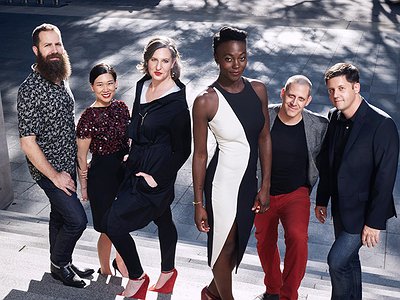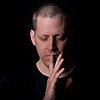There are many descriptions of the ideal state of mind for being creative. What is it like for you? What supports this ideal state of mind and what are distractions? Are there strategies to enter into this state more easily?
I require time. I finally learned this from Tom Morris, Artistic Director of the Ojai Music Festival. When Eighth Blackbird curated festival programming as Music Directors in 2011, the creative time table guided by Mr. Morris was around 3 years. That seemed amazing to me at the time. Now it seems normal for a planning gestation to take 2 or 3 years. One needs time to think about the content, to put it away, to learn about new things, to try some things and find that they don’t work, and then to try some different new things. All this takes time. I don’t always get the luxury of time, it’s true, just like everyone else. And we all adapt and make things work with the available assets. But I prefer to have time. Beyond that, and in more immediate terms, there are things I mentioned earlier, such as hours alone to think and experiment.
How do you make use of technology? In terms of the feedback mechanism between technology and creativity, what do humans excel at, what do machines excel at?
My use of technology is fairly functional. I’m using devices exclusively at this point for parts and scores in performance (remember chargers!), pedals for page turning (syncing, arg!), apps for metronomes and controlling audio playback speeds. What do machines excel at? Machines are the arbiters, the objective party in a dispute. Wondering whether you’re rushing or dragging? Use a metronome. It doesn’t express judgement, it simply gives you the facts. Like a dog, it loves you regardless, and is always there for you.
Collaborations can take on many forms. What role do they play in your approach and what are your preferred ways of engaging with other creatives, through playing together or just talking about ideas?
Well, it’s both, of course. Collaborations are my most dynamic way of working. I feed off conversation and shared ideas. Having to verbalize an idea is a crucial part of my process for crystallizing concepts. But I am very aware of that moment when a conversation pivots from the hypothetical to the actual, when you flip the switch from “what if we” questions and start making a list of action items. One of those action items is always trying something to get an idea of what is actually going happen. Trying something doesn’t necessarily mean playing together, though that is certainly an important option. Trying something can also be a site visit, talking to a third party to gauge reaction, or writing a proposal as an exercise in clarifying ideas. It’s important for the first few steps to be just a few key tasks, enough to make progress, but not so much that you’re overwhelmed before you even get started. This brings us back to time, and a realistic timetable.
How is preparing music, playing it live, and recording it for an album connected? What do you achieve and draw from each experience personally? How do you see the relationship between improvisation and composition in this regard?
Live performance and recording are very different. In the classical music scene, recording has traditionally been treated as a document of the live performance. I don’t believe in this perspective. The concert hall is one instrument, and recording studio is a different instrument. They have different sounds, and different listening interfaces. The interface for the concert goer is the stage, but for someone listening to a recording it is the speakers. Basically, the recorded version is a new interpretation from the one rehearsed for the stage. If you want something to sound like a replica of the live performance, you still have to play it differently in the studio to achieve the illusion. As far as what I achieve from the experience, one point in particular is that making recordings is far and away the best kind of rehearsal. You rack up takes, playing sections over and over, scrutinizing everything, and when the session is done, everything is at a much higher level than before the session. Sometimes I wish we could have a recording session before the recording session!
How do you see the relationship between the ‘sound’ aspects of music and the ‘composition’ aspects? How do you work with sound and timbre to meet certain production ideas and in which way can certain sounds already take on compositional qualities?
This question is kind of a soft ball for a percussionist. Choosing sounds is what percussionists do. A piano usually sounds for the most part like a piano, and there are rarely a dozen different pianos to choose from. When a composer writes a cymbal, even if a composer specifies a type of cymbal (e.g. a splash cymbal), the composer still has no way of really knowing what that cymbal is going to sound like. I have numerous splash cymbals and they’re all different, and the variations expand when choosing mallets. This certainly extends to other instruments. Even if a violinist simply draws the bow across an open string, there are wonderful interpretative possibilities such as bow speed, bow pressure, location of the bow on the string. There is no such thing as a transparent performance in which the musician succeeds in being an unfiltered vehicle for the score. And if one could be successful, there would be no life in it. Live performance is about releasing your personality as a musician; it should be embraced. As I listen, I want to connect with the performer as a real person. If a composition is well crafted, if it’s really got strong legs, then it will stand up to wildly different interpretations.
Our sense of hearing shares intriguing connections to other senses. From your experience, what are some of the most inspiring overlaps between different senses - and what do they tell us about the way our senses work? What happens to sounds at its outermost borders?
Let’s see… sound, sight, touch, smell, taste. I’m not sure I have any reflections on smell and taste. Well, there must be Pavlovian triggers, like the smell of the different woods and skins that I handle and aroma of a fresh coffee; these things evoke connotations of work. Touch is a significant factor in the way my hands draw sound from various objects. In Eighth Blackbird, marrying aural and visual information, especially cues or other facets of ensemble mechanics, is a vital component of communication. It’s not uncommon for me to track an entrance based on the way the fingers shift on Nathalie’s flute or the way Michael’s neck muscles flex prior to a clarinet entrance. By the time a piece is well-rehearsed, the motion, the sights, the communication, these all become an integral part of the sound, no longer peripheral. Despite all that, I find that when I’m listening very intently, I do have a tendency to close my eyes, which can be a problem when I’m playing and, you know, actually hitting the thing I’m supposed to hit.
Art can be a purpose in its own right, but can also directly feed back into everyday life, take on a social and political role, and lead to more engagement. Can you describe your approach to art and being an artist?
Gertrude Stein and Ai Weiwei have both said that art isn’t about the thing produced, but instead that it’s about the way of seeing things. I remember how some years ago we were asked during a Q&A, “Why do you play this music?” We had never been asked this question in such a completely exposed way, and while we shared some reactions we didn’t really have a focused answer. It haunted me and it wasn’t until a long time later that I finally realized that our music makes people think differently. I love this idea of new synapses firing. Of someone having an a-ha moment, of them processing new information. Yes, I think about the cultural relevance of our programming choices, and the importance of intentioned social engagement. But at the same I time I do try to remind myself that the act of exposing people to art for the past two decades is in itself a significant act, and that it has a lasting impact on people. I hope it inspires curiosity. I hope it informs the way they are culturally invested, the way they embrace connectedness, and the way they welcome new information. I hope it changes their way of seeing things.
It is remarkable, in a way, that we have arrived in the 21st century with the basic concept of music and performance still intact. Do you have a vision of music and performance, an idea of what they could be beyond their current form?
My mission with Eighth Blackbird, our mission as an ensemble and now an arts organization, has always been about redefining performance aesthetics. We emerged as a “new music ensemble” but I have always had a personal distaste for that term, and now actively avoid it. Our organization does prioritize new art above everything else, but we no longer exclude repertoire from other periods simply because it is not “new”. No, the priority isn’t what we perform, the priority is HOW we perform it. This has been the trajectory of what now defines Eighth Blackbird, my life’s work, and I believe we have already taken a vision of music and performance from one form to another. It is enough to keep working in this laboratory, and there is enough to keep us occupied for quite a bit longer. I don’t think we’re far enough along for me to have a vision for what comes next, but I certainly hope that we will have contributed to what that comes to be.



